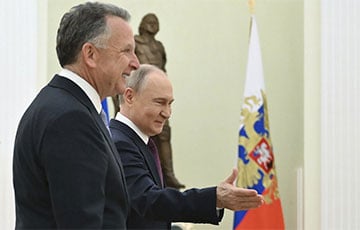Sanctions That Could Trigger Change
- Valery Karbalevich
- 28.06.2021, 11:27

The fact that Lukashenka is the source of all problems has become even more obvious.
The EU and the US are introducing new, tougher economic sanctions against the Belarusian authorities. If earlier the actions of the West to punish the official Minsk were more symbolic, mainly concerned with visa and financial restrictions for individual officials, now they are more focused on the economy.
In the past, sanctions were targeted and applied to individual enterprises or businesses. Now it's different. Sectoral sanctions were adopted at the EU summit on June 24-25. The United States, Canada, and the United Kingdom are also planning to take similar measures. In other words, these sanctions affected entire sectors of the economy (oil refining, potash production, the banking sector). There was no such thing between the official Minsk and the West during the previous crises. In this sense, the current sanctions are unprecedented.
Here's what's remarkable. Belarusian officials and state media have repeatedly accused the opposition of calling on the West to impose sanctions. Like, how can you demand to punish your own country? But these appeals had little effect on the decisions of the EU and the US since they were guided by their own interests.
The Belarusian authorities "helped." Lukashenka’s decision to land the plane broke the emergency brake. EU High Representative for Foreign Affairs and Security Policy Josep Borrell said: "In the case of Belarus, if the plane had not been hijacked, we would not have discussed economic sanctions. This event caused a resonance."
Now the Belarusian issue from a purely humanitarian (violation of human rights by the authorities) has turned into a problem of international security, in particular, aviation security. Leading world powers have concluded that, if the "violator of the convention" is not punished now, similar incidents may occur in the future. Thus, Lukashenka himself imposed tough sanctions. Of course, the fourth package of sanctions was being prepared before the incident with the plane, but Lukashenka provoked the sanctions' unprecedented scale.
What are the authorities going to do in response to the sanctions? First of all, introduce counter-sanctions against the EU and the United States. Halouchanka said that the Belarusian side has “every right to compensation for this damage,” including by imposing restrictions on foreign companies operating in Belarus and belonging to countries pursuing a “particularly unfriendly policy.” He noted that about 300 Lithuanian companies, 200 Ukrainian companies, 160 Latvian companies, 150 German companies, and 140 Polish companies operate in Belarus. Does it mean that the authorities threaten them with nationalization? Or what? But this in Russian political slang means "to bomb Voronezh," that is, in addition to Western sanctions, to impose their own sanctions against their own economy.
The authorities are hoping for help from Russia. Moreover, Russian officials promised such assistance.
Yes, Russia can help create various gray schemes designed to circumvent Western sanctions. Much here will depend on how strictly the EU and the United States will control the implementation of the sanctions. It is unlikely that the Russian market will be able to compensate for the losses of Belarusian oil and potash producers. Moscow, of course, can help with money and new loans, if it wants. But this will set some conditions.
If we talk about the impact of these sanctions on Belarus as a whole, then the cumulative socio-political and psychological effect is important. Any sanctions are a long-term game. Previously, such measures did not work, but now the situation has changed.
First, the current sanctions are much tougher than all the previous ones. In addition, the economy is now hanging by a thread.
Secondly, the sanctions appeared in a different political atmosphere. A single, consolidated society, in which the legitimacy of the authorities is beyond doubt, can successfully withstand external threats. Belarusian society, on the other hand, is fundamentally divided, seriously traumatized, and more politicized than before. The political crisis has not been overcome, confidence in the authorities is low, public discontent has not gone anywhere, it hangs like a sword of Damocles. The government lost its monopoly on the media.
The sanctions appeared against the background of noticeable isolation, exile of Belarus, which cannot be hidden. Take at least the difficulties that Belarusians have to go through, trying to go on vacation to the warm sea.
Against this background, the current sanctions may become an impetus, the launch of complex processes that will contribute to the erosion of the Belarusian social model. In a politicized atmosphere, any new problem will cause additional negativity towards the government. As socio-economic difficulties grow, the fact that Lukashenka is the source of all problems, a toxic figure, will become even more obvious in the eyes of politically not involved people and even his supporters. But today no one can say how and when it will go off.
Valery Karbalevich, Radio Svaboda










